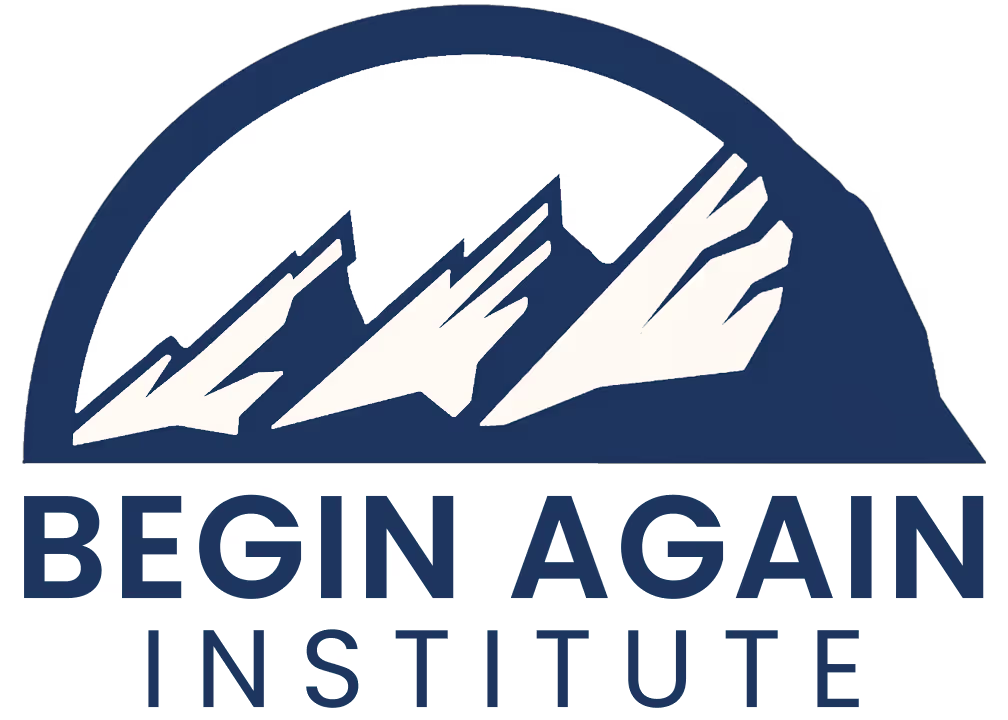Childhood Trauma Symptoms in Adults: Insights & Recovery


Trauma is something many people experience at a young age. Whether it's parental divorce, the death of a pet, or bullying, traumatic experiences can come in many forms. But while some people overcome trauma early on, others will see its effects stretch far into adulthood.
Early trauma can impact your mental, emotional, and physical well-being in ways you may not even realize. Childhood trauma symptoms in adults are complex and diverse, from mental health issues like post-traumatic stress disorder (PTSD) and anxiety to relationship and intimacy problems, low self-esteem, and addictive behaviors.
Fortunately, the ongoing effects of early traumatic experiences don’t have to last forever. Overcoming childhood trauma as an adult is challenging, but it is possible.
At Begin Again Institute, we specialize in dealing with childhood trauma symptoms in adults, especially concerning trauma responses like sex and pornography addiction.
What Is Childhood Trauma?
Childhood trauma happens when a person experiences a distressing or dangerous event at a young age. These events are also known as Adverse Childhood Experiences (ACEs).
The 10 main ACEs are:
- Physical abuse
- Sexual abuse
- Emotional abuse
- Physical neglect
- Emotional neglect
- Living with a relative with a mental health disorder
- Having an incarcerated parent
- Mother being treated violently
- Substance use in the home
- Divorce
Everyone processes trauma differently. What may be perceived as traumatic for one child may not be for another. Emotional trauma is the lasting emotional response to experiencing a traumatic event or a series of traumatic events.
For some people, childhood emotional trauma is resolved early on. While for others, the effects and emotional trauma symptoms can persist far into adulthood, impacting your mental and physical health, relationships, and life choices.
Symptoms of Childhood Trauma in Adults
Childhood trauma can manifest in many different ways throughout your adult life: mentally, emotionally, and even physically.
While official diagnosis should be left to a professional, below are some of the most prevalent signs and symptoms of childhood trauma in adults to look out for.
Post-Traumatic Stress Disorder
PTSD is the most severe trauma disorder. Symptoms of PTSD may occur soon after the event or develop years later, particularly when the trauma is left unresolved.
PTSD keeps the body's "fight-or-flight" response stuck on high. It can make you feel constantly on edge, struggling to relax or switch off from a sense of imminent danger.
Signs of PTSD include:
- Flashbacks or nightmares of the traumatic event
- Hypervigilance and being easily startled
- Memory problems, including forgetting/repressing the traumatic event
- Negative changes in thinking and mood
- Strong reactions to things, places, or people that remind you of the event
- Avoiding trauma-related triggers
Anxiety
Anxiety is another mental health condition that can manifest in adulthood as a result of childhood trauma. Your anxiety may be generalized or triggered by specific situations related to your trauma.
Signs of anxiety include:
- Persistent feelings of worry and apprehension
- Sweating, trembling, or shaking
- Rapid or irregular heartbeat
- Difficulty sleeping
- Nausea or abdominal pain
- Difficulty concentrating
- Being irritable and easily agitated
Depression
Adults who experience trauma at a young age are much more susceptible to depression, mood disorders, and suicidal thoughts.
Childhood trauma impacts cognitive development and functioning. The resulting brain changes and ongoing stress placed on the central nervous system can make you more prone to depressive symptoms later in life.
Signs of depression include:
- Continuous low mood or sadness
- Feelings of hopelessness and worthlessness
- Difficulty with motivation and concentration
- Social withdrawal
- Thinking about or practicing self-harm
- Suicidal thoughts
Emotional Dysregulation
Those struggling with unprocessed childhood trauma often have difficulty regulating emotions. This emotional dysregulation can manifest in many ways.
Signs of emotional dysregulation include:
- Emotions shift quickly and dramatically
- Easily upset or angered by certain situations
- Impulse control issues
- Intense and uncontrollable emotions often lead to outbursts
- Emotional numbness or detachment
Poor Self-Esteem
People who experience trauma often blame themselves for what happened to them, even when it was not their fault.
This deep-rooted shame and internal messages of not being good enough can lead a person to feel unworthy of love or happiness.
Signs of low self-esteem include:
- Feelings of inadequacy
- Doubting your value and abilities
- The constant need for external validation
- Lacking strong personal boundaries
- Perfectionism and constant self-criticism
- Negative self-image
Trust Issues
Many people who experience childhood trauma develop trust issues as adults.
Betrayal, abuse, or neglect experienced as a child can instill deep-seated mistrust in others. And this mistrust can carry over into adulthood. You may subconsciously expect others to repeat the abusive behavior patterns you experienced early in life.
Childhood trauma can make building trust in relationships considerably challenging. Trust issues can negatively affect your relationships with friends, family, and romantic partners.
Attachment and Relationship Problems
Childhood trauma can also disrupt the development of secure attachment styles, leading to attachment disorder and creating difficulties in forming and maintaining healthy relationships.
Many early traumatic events can cause an intense fear of abandonment, mistrust, and low self-esteem. These can lead to the development of anxious or avoidant attachment styles, which cause relationship problems throughout life.
Signs of an anxious attachment style include:
- Being overly attached to and dependent on your partner
- Struggling to be alone
- An intense desire for intimacy and closeness
- Difficulty setting boundaries
Signs of an avoidant attachment style include:
- Hyper independence
- Avoiding and suppressing emotions
- Discomfort with closeness
- Pushing other people away
Substance Use and Other Addictive Behaviors
Another warning flag of childhood trauma is the development of substance use issues and other addictive behaviors.
Unhealthy behaviors may serve as maladaptive coping mechanisms for dealing with unresolved trauma. In other words, people do them to feel better temporarily, then their mind begins to rely on that activity to deal with difficult feelings.
Alcohol and drug use, gambling, or compulsive sexual behaviors can help numb negative emotions in the short term, but they may result in addictions, like those to pornography or sex.
Physical Health Issues
While most people are aware of the mental and emotional effects of unresolved childhood trauma, physical health issues are often less discussed.
Adults who experience adverse childhood experiences (ACEs) are also at higher risk of many serious physical health conditions.
Trauma can lead to an increased risk of chronic health issues such as:
- Diabetes
- Asthma
- Obesity
- Coronary heart disease
- Stroke
- Cancer
The ongoing stress caused by childhood trauma can also lower your immunity, increasing the risk of infections and illnesses later in life.
Signs of Repressed Childhood Trauma in Adults
Some people experience trauma symptoms as an adult but don’t recall experiencing trauma in their childhood. Memory loss or suppression can be a side effect of childhood trauma.
Suppressing unpleasant memories may be your brain’s way of protecting itself from the mental and emotional distress these harmful memories cause.
Signs of repressed childhood trauma in adults include:
- Emotional Dysregulation. This can look like unexplained mood swings, overreactions to minor stressors, or difficulty expressing emotions or articulating your feelings.
- Relationship Issues. You may have difficulty forming close relationships or have a fear of intimacy.
- Low Self-Esteem. You may constantly feel inadequate or strive for perfectionism in everything you do as a way to feel worthy.
- Dissociation. You may feel detached from others and situations, have gaps in your memory, and daydream as a way to avoid dealing with reality or painful situations.
- Hypervigilance. You may startle easily and have a heightened sensitivity to noise. You also may feel on edge or have a great deal of anxiety, even when you’re safe.
- Chronic Guilt or Shame. You can’t let go of the past, even feeling guilt or shame for things outside your control.
- Self-Destructive Behaviors. You engage in self-destructive, risky behaviors, like using substances, reckless driving, or gambling.
- Somatic Symptoms. You experience unexplained physical symptoms like headaches, fatigue, or gastrointestinal issues. You also may get ill a lot because of a weakened immune system resulting from emotional distress.
- Sleep Issues. You may have recurring nightmares or have difficulty falling or staying asleep.
- Avoidance. You avoid dealing with emotions or even taking the time to feel them by overworking and overcommitting.
While these symptoms don’t automatically mean you’re suppressing childhood trauma, they are indicators that you’re experiencing some sort of emotional distress and may need to consider speaking with a mental health professional to uncover the root cause.
Remembering and accepting your past trauma is an essential step in healing from it. You can’t heal from what you don’t know or acknowledge exists.
The Connection Between Childhood Trauma and Adult Addictions
There’s a strong link between childhood trauma and addiction. People who experience abuse, neglect, or other forms of trauma during their early years are significantly more likely to develop addictions later in life.
This connection is particularly prevalent in the field of sex and pornography addictions. One prominent study found that 72% of adults with a sex addiction reported physical abuse as a child, while 97% reported emotional abuse of some kind.
But what causes this correlation?
Traumatic experiences at a young age can lead to neurobiological changes. These changes affect the areas of the brain involved in stress response and reward processing. When you experience trauma, you go into a state of perpetual fight-or-flight. The only way out is to find a source of dopamine, the brain’s feel-good chemical.
Sex, masturbation, and pornography are sources of dopamine many people have access to. Engaging in compulsive sexual behaviors can work as a coping mechanism and help you deal with negative emotions in the short term. It gives you a quick fix. But it won’t help you overcome your trauma and its symptoms in the long run.
What happens instead is that your brain becomes addicted to the dopamine hit you receive from these activities, making you want to repeat them. Once you begin to see the negative effects on your life, you may try to stop these behaviors, but by then, an addiction may have formed, making it almost impossible for you to quit without professional assistance.
How to Treat Childhood Trauma in Adults
When combating addiction driven by unresolved childhood trauma, it’s vital to choose a therapist who specializes in trauma-informed therapy.
Most traditional treatment methods for addiction only treat the resulting symptoms and any co-occurring mental health disorders. For more substantial and long-term recovery, it’s crucial to identify the underlying cause. By identifying the root cause of the addiction, you can treat it at its core, minimizing the chance of relapse.
At Begin Again Institute, our team of Certified Sex Addiction Therapists (CSAT) have a highly specialized knowledge of trauma and its long-lasting effects. We use the Trauma-Induced Sexual Addiction (TINSA) model to help men identify, understand, and heal from the childhood trauma that led to sex addiction and intimacy issues. It helps you overcome past experiences and learn the tools needed to regulate your nervous system and rebuild healthy neural pathways.
“TINSA allows people to figure out the ‘why’ behind addiction,” said Matt Wenger, Clinical Director at Begin Again Institute.
“It’s a very targeted approach to relieve the symptoms and take the pressure down to act out. It can teach regulating tools to help you make better decisions based on cost-benefit and risk-reward. It helps you engage in positive coping skills.”
Our 14-Day Men’s Intensive can help you jumpstart your recovery through our proven trauma-focused approach. The program focuses on stopping destructive behaviors by understanding and treating the root cause of those actions — trauma.
If you want a faith-based approach to healing, our Boulder Recovery 14-Day Christian Men’s Intensive offers the same benefits while helping you reestablish your connection with yourself and God.
Overcoming Childhood Trauma at Begin Again Institute
At Begin Again Institute, we don’t just treat the symptoms of childhood trauma in adults. We treat the unresolved trauma itself, helping you heal from the long-term effects of childhood trauma.
Healing from the underlying trauma can lead to more effective and long-lasting recovery from the symptoms, including addictive behaviors.
Begin Again Institute is here if you or a loved one needs help. Contact us today for more information or to speak with an admissions specialist.
Test Intensive Date
We get right to work, so you can get back to life.
“Begin again helped me jumpstart my healing. It’s like
a years worth of therapy in one trip.”


